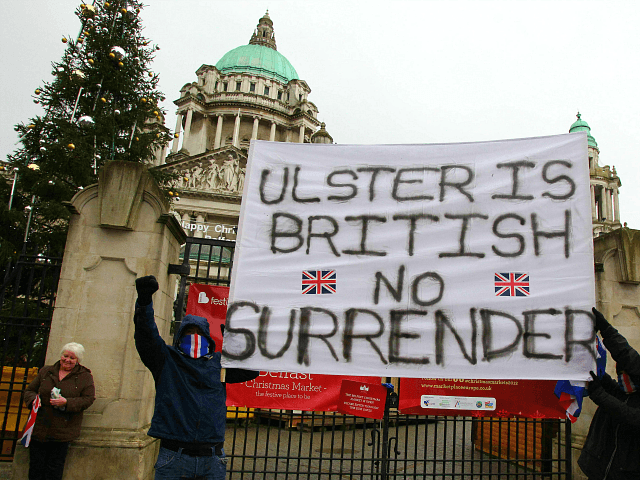Polls show that just 22 percent of Northern Irish people support breaking with Brexit Britain and joining with EU Ireland — a heavy blow to Remainers who have used issues around the Province to argue that the Government should halt or reconsider the public’s decision to leave the bloc.
During the referendum, Ulster’s then-First Minister Arlene Foster campaigned for a Leave vote, and Theresa May’s minority administration currently depends on the support of MPs from her Democratic Unionist Party (DUP) for its parliamentary majority.
By holding the balance of power in the House of Commons, the DUP has proven to be Brexit’s most effective lobbyist, pressuring the Remain-supporting Prime Minister to deliver on the referendum result.
Mrs Foster has also intervened robustly when Mrs May has seemed tempted to give in to EU demands that Ulster should be economically annexed by Brussels and incorporated into its Customs Union and Single Market in order to prevent a so-called ‘hard border’ with the Irish Republic.
EU loyalists have long argued that sticking to the DUP’s hard line on the British Home Nations — England, Scotland, Wales, and Northern Ireland — all leaving the EU on the same terms, with no question of a customs border between Ulster and the British mainland, risks undermining the Province’s place in the United Kingdom.
But the results of the Northern Ireland Life and Times Survey organised by Queen’s University and Ulster University, which shows that just 22 percent of respondents back a Northern Irish exit from the British Union and merger with the EU-based Irish Republic, casts this narrative into serious doubt.
Fifty-six percent of Ulsterwomen and 54 percent of Ulstermen said they would vote for Northern Ireland to remain part of the United Kingdom. In contrast, 21 percent of women and 24 percent of men said they would vote for Northern Ireland to unite with the Republic of Ireland. (Twelve percent of women and 13 percent of men were undecided.)
By age, support for the British Union was strongest with the over 65s, on 67 percent, and 45- to 64-year-olds, at 57 percent.
It was weakest among young people aged 18 to 24 — whose memories of the Provisional Irish Republican Army’s campaign of terror bombings and assassinations against members of the Armed Forces, police force, politicians, and ordinary members of the public may be relatively weak — on 33 percent.
This still beats support for a United Ireland among 18- to 24-year-olds, however, which stands at 29 percent.
The survey also suggests that a significant minority of the Roman Catholic population supports remaining in the United Kingdom, at 25 percent, while the number of Protestants who support a United Ireland is vanishingly small, at 2 percent.
Indeed, positive support for a United Ireland among Catholics is not quite a majority position, on 49 percent — compared to an overwhelming majority of Protestants who support staying in the United Kingdom, at 85 percent.
Fifty-two percent of people professing no religion also back the Union with Great Britain, compared to 12 percent who back a United Ireland.
Northern Ireland last held a referendum on its constitutional position in 1973, with 99 percent of voters saying they wanted to stay in the United Kingdom, on a turnout of 59 percent.

COMMENTS
Please let us know if you're having issues with commenting.